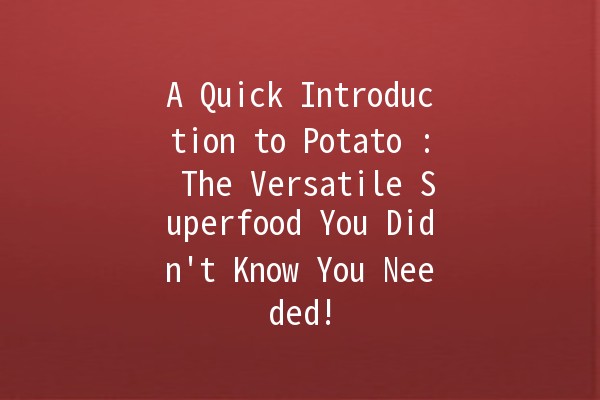Potatoes have been a staple food for centuries and are often considered one of the most versatile ingredients in cooking. In this article, we'll explore the world of potatoes, providing you with useful tips and productivity hacks to make the most of this incredible superfood. From its nutritional benefits to innovative cooking techniques, you'll find everything you need to know about potatoes right here.
Understanding Potatoes: An Overview
Potatoes belong to the nightshade family and are rich in carbohydrates, which makes them a great source of energy. Not only are they versatile in cooking, but they also come in numerous varieties, each with a unique flavor profile and best uses. To start your potato journey, let's delve into some essential facts.
Nutritional Benefits of Potatoes
Rich in Vitamins and Minerals: Potatoes are an excellent source of Vitamin C, Vitamin B6, potassium, and dietary fiber.

Low in Calories: When prepared correctly, potatoes can be a lowcalorie food choice that keeps you full longer.
High in Antioxidants: They contain various antioxidants that promote health and help combat diseases.
Productivity Boosting Tips for Cooking Potatoes
To enhance your culinary skills and make your cooking process more efficient, here are five productivity tips you might find helpful.
One of the best ways to save time in the kitchen is to prepare your potatoes before you plan to cook.
Application Example:
Peel and chop your potatoes a day in advance, then store them in cold water in the refrigerator. This reduces prep time when you're ready to cook and helps keep the potatoes from browning.
Different potato varieties work well with different cooking methods. Understanding this can save you time and improve the final dish.
Application Example:
Baking: Russet potatoes are great for baking due to their fluffy interior.
Mashing: Yukon Gold potatoes are perfect for creamy mashed potatoes because of their buttery texture.
Frying: Choose starchy potatoes like Idaho or Russets for frying, as they yield a crispier texture.
Another efficient way to utilize potatoes is to batch cook them. This method saves time throughout the week.
Application Example:
Prepare a large batch of roasted potatoes seasoned with your favorite spices. Store them in an airtight container and reheat them for quick meals throughout the week. They can be added to salads, omelets, or served as a side dish.
Having the right kitchen tools can make a significant difference in your cooking efficiency.
Application Example:
Instant Pot: Use an Instant Pot for fast cooking. Potatoes can be cooked in just a few minutes under pressure.
Mandoline Slicer: A mandoline can help you achieve uniform potato slices quickly, ideal for gratins or chips.
Don't let leftover potatoes go to waste! Use them creatively in your next meal.
Application Example:
Turn leftover mashed potatoes into potato cakes by mixing with cheese and herbs, then panfrying until crispy. You can also add them to soups for added creaminess or use them as a filling for tacos.
(not required)
While I will avoid summarizing, this exploration of potatoes has provided practical advice, ensuring that you'll be equipped with knowledge to enhance your culinary experience with this fantastic ingredient.
Frequently Asked Questions
Potatoes should be stored in a cool, dark place with good ventilation. Avoid refrigerators as cold temperatures can cause the starch to convert into sugar. Ensure they are kept away from onions to prevent them from sprouting. Consider using a burlap sack or a cardboard box to allow proper airflow.
Yes, potato skins are edible and packed with nutrients. They contain fiber, vitamins, and minerals. Ensure you wash them thoroughly to remove any dirt or chemicals before cooking. If you’re baking the potatoes, keep the skins on for a more nutritious meal.
To boil potatoes correctly, start with cold water and add salt. This step allows the potatoes to cook evenly. Cut the potatoes into uniform pieces and ensure they are covered by at least an inch of water. Boil until tender, usually 1520 minutes, depending on the size.
When potatoes are exposed to air after peeling, they may oxidize and turn brown. To prevent this, you can soak them in cold water until you’re ready to cook. Adding a splash of vinegar or lemon juice to the water can also help inhibit oxidation.
For frying, starchy potatoes such as Russets or Idaho varieties are preferable. Their low moisture content results in a crispy exterior and tender interior. If you want to make chips, consider using Yukon Gold potatoes for a buttery flavor.
Yes, you can freeze cooked potatoes, but it’s best if you avoid freezing raw potatoes as their texture deteriorates. To freeze, ensure they are fully cooked and cooled to room temperature. Place them in airtight containers or freezer bags, and they can last up to 10 months.
With this information, you are well on your way to mastering the art of cooking with potatoes. Enjoy exploring the delicious possibilities that this humble ingredient has to offer!